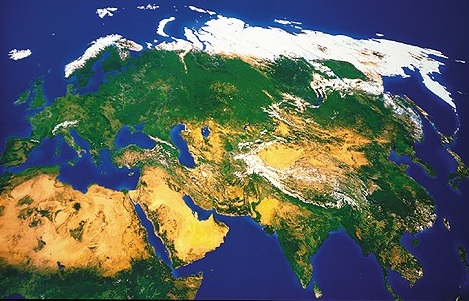
What’s in a Name? Uncovering the Hidden Stories Behind Eurasian Country Names
4 min readDo you know why India is called India, or what Thailand’s name reveals about its people’s values? Country names often carry fascinating stories of ancient civilizations, cultural pride, and historical transformations. Through etymology – the study of words’ origins and how their meanings have changed over time – we can uncover these hidden narratives.
Etymology is like detective work with words. It traces how names evolved across languages, cultures, and centuries. When we study country names, we’re not just learning vocabulary; we’re discovering how ancient people viewed themselves and others, what they valued, and how they interacted.
Western Europe: Identity Through Tribes and Geography
The names of Western European countries often reflect ancient tribal histories and geographic features. Britain, for instance, comes from the Proto-Celtic “Pritani” or “Pretani,” meaning “painted” or “tattooed people” – a reference to the ancient Britons’ practice of decorating their bodies. The name evolved through Latin “Britannia” to become today’s Britain. Within the UK, “England” literally means “land of the Angles” (a Germanic tribe), while “Wales” comes from the Anglo-Saxon word “Wealh,” meaning “foreigner” or “Celtic speaker.”
France bears the name of the Franks, a Germanic tribe whose name might mean “fierce” or “free” in Old Germanic. The transformation from “Francia” to “France” tells the story of how one tribe’s identity became a national identity. Similarly, Germany’s native name “Deutschland” comes from the Old High German “diutisc,” meaning “of the people“.
Mediterranean: Ancient Civilizations
Greece offers an intriguing case of dual naming. While we know it as Greece (from Latin “Graecia”), Greeks call their country “Hellas” (Ελλάδα). The origin of “Hellas” remains debated, possibly coming from the ancient Selloi tribe.
East Asia: Cosmic and Cultural Identity
East Asian country names often reflect profound cultural and philosophical concepts. Japan’s native name “Nippon” or “Nihon” (日本) literally means “sun origin,” poetically translated as “Land of the Rising Sun.” This name came from China’s perspective of Japan being east (where the sun rises). The English word “Japan” evolved through a series of translations and adaptations through Chinese, Malay, and Portuguese.
China’s native name “Zhongguo” (中国) means “Middle Kingdom,” reflecting its ancient worldview as the center of civilization. The English name “China” likely comes from the Qin Dynasty through Sanskrit and Persian trading routes, showing how trade networks influenced geographical naming.
Korea’s various names tell a story of dynastic changes. “Korea” comes from the Goryeo Dynasty, while its native name “Hanguk” (한국) refers to the Han people. The traditional name “Joseon” (조선) poetically means “Land of Morning Calm.”
Southeast Asia: Freedom and Identity
Thailand’s name (ประเทศไทย) carries a powerful message of independence. “Thai” means “free” in the Thai language, making Thailand literally the “Land of the Free People.” This name replaced “Siam” in 1939, marking a conscious shift toward emphasizing national identity and independence.
South Asia: Rivers and Legends
India’s names reflect both geography and mythology. While “India” comes from the River Indus (through Persian “Hindu” and Greek “Indikós”), its native name “Bharat” (भारत) refers to an ancient emperor and carries deep mythological significance.
What Names Tell Us About Human History
Etymologies reveal fascinating patterns in how places get their names:
- Geographic features (like rivers and mountains)
- Dominant tribes or peoples
- Cultural values (like freedom or centrality)
- Directional descriptions
- Historical events and figures
Understanding these origins helps us appreciate both the uniqueness of each culture and our shared human history. Country names are more than just labels on a map – they’re windows into the past, revealing how ancient peoples saw themselves and their place in the world.
Related posts
 Kick the Habit: Origins and Meaning
Kick the Habit: Origins and Meaning
Discover the origins and meaning of the phrase ‘kick the habit.’ Learn how it evolved from drug withdrawal symptoms to a powerful metaphor for breaking bad habits, with examples to inspire your journey to change.
1 min read Family Phrasal Verbs
Family Phrasal Verbs
В англійській мові існує понад 3000 фразових дієслів, що робить їх одним із наймасштабніших і найскладніших аспектів мови. У цій статті ми розберемо кілька корисних Family Phrasal Verbs.
2 min read